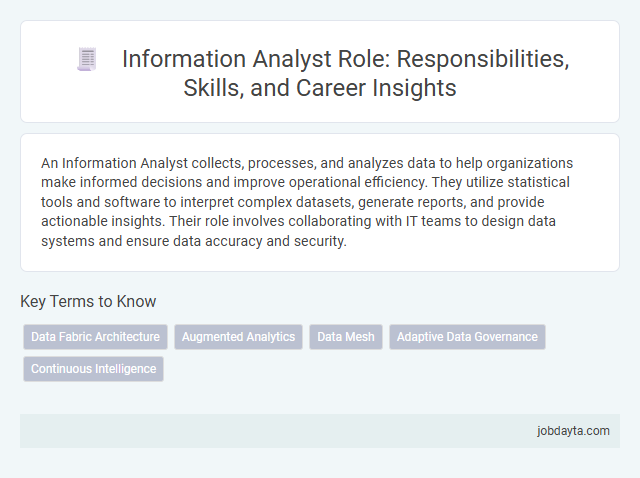An Information Analyst collects, processes, and analyzes data to help organizations make informed decisions and improve operational efficiency. They utilize statistical tools and software to interpret complex datasets, generate reports, and provide actionable insights. Their role involves collaborating with IT teams to design data systems and ensure data accuracy and security.
Introduction to the Role of an Information Analyst
An Information Analyst plays a crucial role in interpreting and managing data to support business decisions. This position involves analyzing complex datasets to provide actionable insights and improve organizational performance.
- Data Interpretation - Extracts meaningful patterns and trends from large volumes of data.
- Reporting - Prepares detailed reports that communicate findings clearly to stakeholders.
- Collaboration - Works closely with IT teams and business units to align data strategies with company goals.
Effective Information Analysts combine technical expertise with business acumen to drive data-informed decision-making processes.
Key Responsibilities of an Information Analyst
An Information Analyst collects, processes, and interprets data to support business decisions. They ensure data accuracy and relevance by validating and organizing information from multiple sources.
Analyzing trends and patterns allows the analyst to generate detailed reports and actionable insights. You play a crucial role in optimizing data systems and improving information flow within the organization.
Essential Technical Skills for Information Analysts
Information analysts must possess strong data analysis skills to interpret complex datasets accurately. Proficiency in SQL and database management systems is crucial for extracting and organizing information efficiently. Knowledge of data visualization tools such as Tableau or Power BI enhances the ability to present insights clearly to stakeholders.
Analytical and Problem-Solving Abilities Needed
Information Analysts require strong analytical skills to interpret complex data sets and extract meaningful insights that drive strategic decisions. Problem-solving abilities enable them to identify inefficiencies, develop innovative solutions, and optimize IT processes effectively. Mastery of data analysis tools and critical thinking ensures accurate evaluation and resolution of technical challenges in diverse IT environments.
Tools and Software Commonly Used by Information Analysts
Information Analysts utilize a variety of specialized tools and software to collect, process, and interpret data effectively. These technologies enable accurate decision-making and strategic planning within organizations.
- Microsoft Excel - A powerful spreadsheet tool used for data organization, analysis, and visualization.
- SQL - A programming language used to manage and query relational databases.
- Tableau - A data visualization software that helps create interactive and shareable dashboards.
Educational Background and Certifications for Information Analysts
| Educational Background |
|
|---|---|
| Certifications |
|
Career Path and Advancement Opportunities in Information Analysis
Information Analysts play a crucial role in interpreting complex data to support business decision-making. Their expertise in data management and analytical tools drives organizational efficiency and growth.
Career advancement in information analysis often progresses from junior analyst to senior analyst, eventually leading to roles such as data scientist or IT project manager. Professionals can enhance their prospects by gaining certifications in data analytics, programming, and business intelligence.
Challenges Faced by Information Analysts in the IT Industry
Information analysts play a crucial role in transforming data into actionable insights within the IT industry. They face numerous challenges that impact the accuracy and efficiency of data analysis processes.
- Data Overload - Managing and filtering vast volumes of complex data from multiple sources often overwhelms information analysts.
- Data Quality Issues - Inconsistent, incomplete, or inaccurate data hampers the ability to deliver reliable analysis and informed decision-making.
- Rapid Technology Changes - Keeping up with constantly evolving IT tools and analytics software demands continuous learning and adaptation.
Impact of Information Analysts on Business Decision-Making
How do Information Analysts influence business decision-making? Information Analysts collect and interpret data to provide insights that guide strategic decisions. Their expertise enables businesses to identify trends, reduce risks, and optimize operations for improved performance.
Future Trends and Emerging Technologies in Information Analysis
Information analysts play a crucial role in interpreting data to drive strategic decision-making. Emerging technologies like artificial intelligence and machine learning are transforming the methods and accuracy of information analysis.
Future trends indicate a growing reliance on big data analytics and predictive modeling to anticipate market shifts and consumer behavior. Cloud computing enables scalable data storage and real-time processing, enhancing analytical capabilities. Advanced natural language processing tools facilitate deeper insights by analyzing unstructured data sources.
Related Important Terms
Data Fabric Architecture
Information Analysts specializing in Data Fabric Architecture design and implement integrated data management frameworks that enable seamless data access, processing, and governance across diverse sources and environments. Leveraging metadata-driven automation and AI-powered data integration, they enhance data agility, quality, and real-time analytics capabilities critical for enterprise decision-making.
Augmented Analytics
Information Analysts leveraging augmented analytics harness AI-driven tools to automate data preparation, enhance predictive insights, and optimize decision-making processes. This integration accelerates data interpretation, enabling more accurate trend identification and actionable recommendations in complex IT environments.
Data Mesh
Information Analysts specializing in Data Mesh architecture enable decentralized data ownership and domain-oriented data product management, enhancing scalability and data accessibility across organizations. Their expertise in distributed data governance and real-time data integration ensures seamless cross-functional insights and drives data-driven decision-making.
Adaptive Data Governance
Information Analysts specializing in Adaptive Data Governance implement dynamic policies that evolve with organizational data flows, ensuring compliance and integrity across diverse IT environments. Their expertise enables real-time data quality assessment and risk mitigation, harmonizing regulatory demands with agile business intelligence frameworks.
Continuous Intelligence
Information Analysts utilize continuous intelligence by integrating real-time data analytics and machine learning to enhance decision-making processes and operational efficiency. This approach enables businesses to detect patterns, predict outcomes, and respond promptly to dynamic IT environments.
Information Analyst Infographic

 jobdayta.com
jobdayta.com